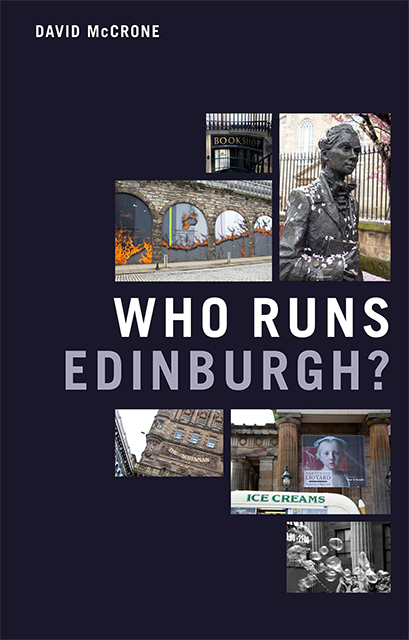Book contents
- Frontmatter
- List of Contents
- Figures and Tables
- Preface
- 1 Who Runs Edinburgh?
- 2 Politics in Edinburgh
- 3 Winners and Losers: The Political Economy of Edinburgh
- 4 Treading Angels: Edinburgh and its Festivals
- 5 Are You One of Us? Status in the City
- 6 What School did You Go To? Education and Status in Edinburgh
- 7 Enlightened City: Cultural Power and University Life
- 8 Developing Edinburgh: Pies in the Sky, Holes in the Ground
- 9 Lost in Leith: Accounting for Edinburgh’s Trams
- 10 Does Anyone Really Run Edinburgh?
- Bibliography
- Index
9 - Lost in Leith: Accounting for Edinburgh’s Trams
Published online by Cambridge University Press: 25 October 2023
- Frontmatter
- List of Contents
- Figures and Tables
- Preface
- 1 Who Runs Edinburgh?
- 2 Politics in Edinburgh
- 3 Winners and Losers: The Political Economy of Edinburgh
- 4 Treading Angels: Edinburgh and its Festivals
- 5 Are You One of Us? Status in the City
- 6 What School did You Go To? Education and Status in Edinburgh
- 7 Enlightened City: Cultural Power and University Life
- 8 Developing Edinburgh: Pies in the Sky, Holes in the Ground
- 9 Lost in Leith: Accounting for Edinburgh’s Trams
- 10 Does Anyone Really Run Edinburgh?
- Bibliography
- Index
Summary
Why write about Edinburgh's trams in a book about who runs Edinburgh? Studies of local power often run aground on the rock of assumptions; that non-decisions are as interesting as actual decisions. The Edinburgh trams issue, and the ensuing inquiry, gives us a glimpse of structures of power and influence. Who matters, and who doesn’t? Who pulls strings, and why? Which constellations of power are drawn in to bring things about, or in negative form, to prevent an outcome? And are there institutions and organisations which matter more than most; vestiges of power and influence? Thus, we are likely to learn more from controversies when struggles are more explicit than when things are as they appear. These are broad questions, providing a context for the study of Edinburgh's trams.
Simply put, the saga of the Edinburgh trams, and the ensuing public inquiry, sheds light on systems of power and influence in the city. Drawing mainly upon inquiry evidence, we can piece together why the project was over-budget, curtailed in length, and failed to meet the original timetable. We can see how blame was apportioned by key actors. ‘The trams’ as it's come to be known as shorthand, is a ‘megaproject’, to be understood in the context of outsourcing the state, both national and local. More generally, it treats Edinburgh as an example of the ‘calculable city’, in which assets are treated as future forms of revenue rather than as public resources.
The trams saga, at the time of writing, more than two and a half years after the inquiry ended, is not yet complete, as Lord Hardie who chairs it still has to publish his report on ‘what went wrong’; the inquiry itself has cost at least £10m. However, the collection of evidence to the public inquiry –some 7 million words –came to an end over two years previously. It provides both a statement and transcript evidence from key players, and is the basis for the account here.
The chapter has three sections: first, the story of the Edinburgh trams project; second, ‘the blame game’, in which accusations flew about hither and thither; and thirdly, my analysis of why ‘the trams’ went horribly wrong. Finally, and briefly, we will return to the question of power in Edinburgh.
TRAMS: ANCIENT AND MODERN
It is useful to start with a short history of the trams project.
- Type
- Chapter
- Information
- Who Runs Edinburgh? , pp. 224 - 247Publisher: Edinburgh University PressPrint publication year: 2022

